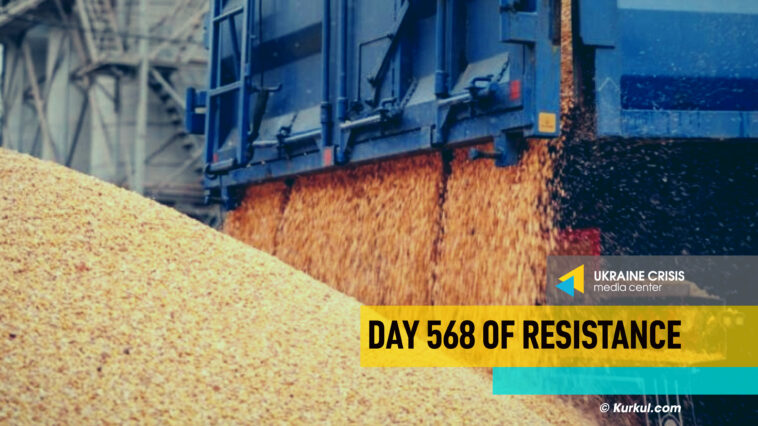Ukraine destroys another Russian S-400 Triumph air defense system in Crimea. Ukraine’s Foreign Ministry gives five reasons why the EU should drop a ban on Ukrainian grain imports. The International Criminal Court opens a field office in Kyiv.
Ukraine destroys Russian S-400 Triumph air defense system near Yevpatoria in Crimea
Ukraine destroyed a Russian S-400 Triumph air defense system in a drone and missile attack near Yevpatoriya, in annexed Crimea, overnight on September 14. The system is an important part of Russia’s air defense in the peninsula. That’s Ukraine’s second such successful operation. On August 23, the Ukrainian military destroyed another of Russia’s S-400 Triumph air defense systems on Cape Tarkhankut in Crimea.
The air defense system was destroyed in a joint operation by Ukraine’s Security Service and Navy, the New Voice of Ukraine reported, citing sources in the Security Service.
Drones and Ukrainian-made Neptun missiles struck the S-400 Triumph system. Ukraine’s Security Service managed to blind the S-400 system by firing a series of drones at its radar and antenna before the Navy fired two of its Neptune missiles at the system’s launch complexes, the sources said.
“More surprises are awaiting the Russians in Crimea,” they added.
Ukraine’s Foreign Ministry gives five reasons why EU should drop ban on Ukrainian grain imports
The European Union has to lift import restrictions on Ukrainian grain that are due to expire on Friday, September 15, spokesperson for Ukraine’s Foreign Ministry Oleh Nikolenko said on Facebook. He listed five reasons for the EU to remove the ban.
1. Ukraine and the EU created a joint coordination platform to address the concerns raised by some of the EU member states.
2. Ukrainian grain exports are not the root cause of destabilization in the EU’s single market. During the time when the European Commission’s ban was applied and Ukrainian agricultural products were outside the market, the problems of farmers in Slovakia, Poland, Romania, and Hungary were not resolved. National governments have to make decisions that exclude restrictions on Ukrainian agricultural exports. Brussels has an array of tools to support them.
3. Bulgaria’s decision to resume the imports of Ukrainian grain adopted on September 14, comes as another confirmation that these one-sided restrictions are groundless.
4. Russia, Ukraine’s competitor in international grain markets, benefits from the restrictions on exports of Ukrainian grain. Russia’s unlimited access to the EU market is a considerable advantage. A shrinking share of Ukrainian grain leads to a possibility for Russia to increase its profit that it uses to fuel its war in Ukraine.
5. The import ban is unlawful. It violates the EU-Ukraine Association Agreement and the foundations of the EU’s single market.
International Criminal Court opens field office in Kyiv
The International Criminal Court (ICC) has opened a field office in Kyiv, the largest one outside its headquarters in The Hague.
“This marks a new chapter in our cooperation,” Ukraine’s Prosecutor General Andriy Kostin told a joint news conference with ICC Prosecutor Karim Khan in Kyiv on Thursday. “The [Ukrainian] office will help strengthen cooperation between Ukraine and the International Criminal Court, increase efficiency of response to the crimes that Russia continues to commit against Ukraine and Ukrainians every day,” he said.
“What we’ve seen in terms of the International Criminal Court’s partnership with Ukraine, building partnerships with civil society, other members of the United Nations, state parties and non-state parties of the ICC is not a flash in the pan. This is part of a new dawn in which we have to show, and we are showing so far, stamina, focus to make sure our words are not empty words. They are felt by victims around the world, in Ukraine, where I have the honor of being now, but in other parts of the world as well,” Karim Khan said.
In March, the International Criminal Court issued an arrest warrant for Russian President Vladimir Putin for war crimes, accusing him of personal responsibility for the abductions of children from Ukraine.
Counteroffensive scrutiny: propaganda, PSYOP, or genuine concerns? Ukraine in Flames #507
In this episode, we delve into the growing concerns of Western observers regarding Ukraine’s counteroffensive, which has fallen short of expectations and faces the risk of a stalemate. We also explore how russian propaganda is working to convince European politicians that resisting the Kremlin is futile and that negotiations are the only way forward. Watch Ukraine in flames #507 to find out about the origins of the wave of negativity and criticism surrounding Ukraine’s counteroffensive in the Western media and explore psychological means the russian federation is applying in the informational field.
Guests:
- Marianna Prysiazhniuk, Head of the Hybrid Warfare Analytical Group at Ukrainian Crisis Media Center
- Mykhailo Samus, Military Expert, Director of the New Geopolitics Research Network




